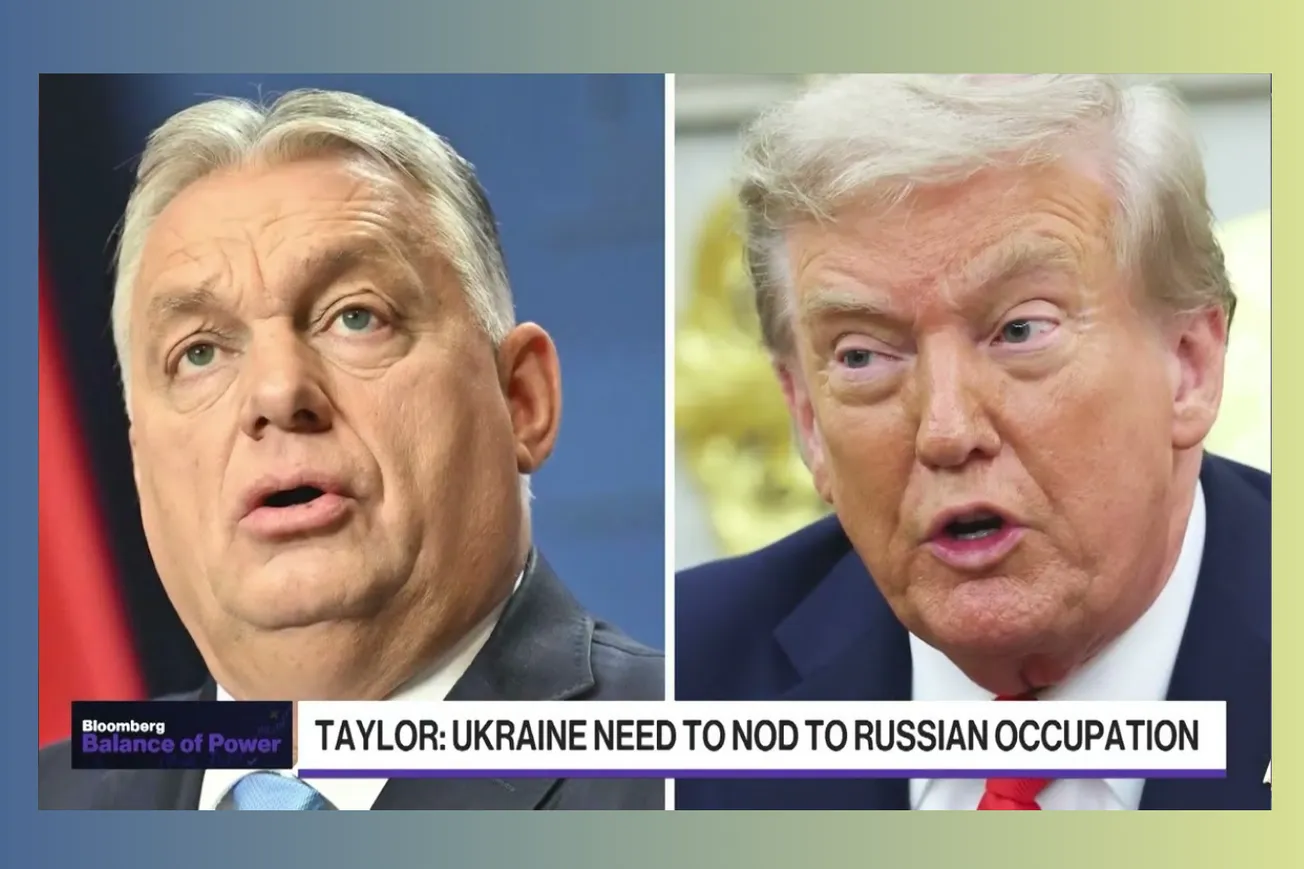Table of Contents
Trump administration pressures Putin and Zelensky toward bilateral summit while European leaders accelerate work on comprehensive security package involving British and French peacekeeping forces.
President Trump's diplomatic offensive to end the Ukraine war intensifies as allies work to establish concrete security guarantees that could deter future Russian aggression.
Key Takeaways
- Trump held calls with Putin and Hungarian PM Viktor Orban after White House summit, pushing for Putin-Zelensky bilateral meeting despite Moscow's lukewarm response
- European leaders accelerating security guarantees package potentially including British and French peacekeeping troops in Ukraine as part of peace deal framework
- Ukraine may accept de facto Russian control of 19% of territory while maintaining legal claims, rejecting formal territorial concessions demanded by Putin
- EU membership pathway for Ukraine gaining momentum despite Orban's opposition, with Trump directly pressuring Hungarian leader to drop resistance
- Military officials from US, Germany, UK, and France planning coordination meetings on security guarantee implementation and burden-sharing arrangements
- Former ambassadors warn Putin seeks to drag out conflict rather than genuinely negotiate, requiring sustained pressure including economic sanctions to force serious talks
- Trump's approach described as "herding sheep" - using varied diplomatic pressure to push all parties toward eventual negotiated settlement
Timeline Overview
- 00:00–18:30 — Breaking News and Context: White House confirms Trump calls with Putin and Orban, European leaders accelerate security guarantee discussions
- 18:30–35:45 — Ambassador Taylor Analysis: Security coalition capabilities, territorial concession realities, and deterrence requirements for sustainable peace framework
- 35:45–52:20 — Economic Policy Impact: Trump tariff expansion effects, Adam Posen on global economic paradigm shift and international insurance model breakdown
- 52:20–68:15 — Diplomatic Strategy Assessment: Kurt Volker on mission definition challenges, pressure tactics necessity, and alliance coordination complexities
- 68:15–82:30 — Texas Redistricting Drama: Democratic lawmakers detained in chamber, Republican surveillance demands, and broader redistricting politics implications
- 82:30–END — Political Panel Discussion: Ukraine peace process challenges, redistricting optics, and Trump's diplomatic credibility stakes
Trump's Multi-Track Diplomatic Offensive Intensifies
President Trump has launched an unprecedented diplomatic push to broker Ukraine peace talks, utilizing direct presidential diplomacy with adversaries and allies alike. This approach represents a significant escalation in his promised efforts to end the conflict within his first term.
- Trump conducted a 40-minute phone call with Vladimir Putin immediately after hosting European leaders at the White House, demonstrating his willingness to engage directly with the Russian president
- Following the Putin conversation, Trump called Hungarian Prime Minister Viktor Orban at European leaders' request to pressure him regarding Ukraine's EU membership bid
- European allies are moving with unusual speed to develop concrete security guarantees, suggesting urgency to lock in Trump's support while momentum exists
- Military coordination meetings between US, German, British, and French officials indicate serious operational planning beyond diplomatic positioning
- The trilateral meeting format (Trump-Putin-Zelensky) reflects Trump's preference for personal diplomacy over traditional multilateral frameworks
Former officials note this represents a stark contrast to traditional diplomatic approaches that typically involve extensive preliminary negotiations before high-level meetings.
European Security Architecture Takes Shape
European leaders are rapidly developing a comprehensive security framework that could involve up to 30 nations providing peacekeeping forces and deterrence capabilities. This "coalition of the willing" approach aims to fill security gaps while avoiding immediate NATO expansion.
- British and French forces would likely form the core of any peacekeeping deployment, with both nations possessing expeditionary capabilities and nuclear deterrence
- US contribution would focus on "air cover" and intelligence support rather than ground troops, leveraging American technological advantages without requiring boots-on-ground commitment
- The security framework must integrate seamlessly with existing NATO structures to avoid creating competing European security systems
- Economic reconstruction support would complement military guarantees, providing positive incentives for sustainable peace alongside deterrence mechanisms
- Approximately 30 nations have already expressed willingness to participate, providing substantial collective economic and military resources
Former Ambassador William Taylor emphasized that such a coalition possesses sufficient deterrent capability, particularly with US air support and intelligence integration.
Territorial Concessions: De Facto Versus De Jure Control
The territorial dimension represents the most sensitive aspect of potential peace negotiations, with Ukraine willing to accept temporary Russian occupation while rejecting permanent territorial surrender. This distinction could provide face-saving opportunities for all parties.
- Ukraine grudgingly accepts that Russia currently controls approximately 19% of Ukrainian territory but refuses to formally cede legal claims to these areas
- This approach parallels situations like Cyprus or Kashmir, where de facto control differs from internationally recognized sovereignty
- Putin's demands for formal territorial recognition exceed what Ukraine can politically accept while maintaining domestic legitimacy
- German Chancellor's "Florida analogy" illustrates how territorial concessions would be viewed as fundamentally unacceptable to Ukrainian public opinion
- European leaders deliberately avoided discussing territorial concessions during White House summit, indicating unified opposition to pressure on Ukraine
Former officials stress that Ukraine's position reflects both strategic necessity and domestic political constraints that cannot be ignored in sustainable negotiations.
EU Membership Pathway Gains Momentum
Ukraine's European Union membership prospects are advancing despite Hungarian opposition, with Trump's direct intervention potentially breaking long-standing deadlocks. This economic integration offers alternative security benefits beyond military guarantees.
- EU membership process for Ukraine is "well on the way" according to former Ambassador Taylor, with substantial progress on institutional reforms and alignment
- Viktor Orban's opposition to Ukrainian EU membership represents the primary remaining obstacle among member states
- Trump's willingness to personally pressure Orban demonstrates American recognition of EU integration's importance for long-term stability
- Economic union membership would provide substantial financial resources for reconstruction and development, complementing security guarantees
- EU membership offers permanent institutional anchoring to Western structures, reducing long-term security dependence on external guarantees
The EU pathway provides economic incentives that could help sustain peace agreements beyond immediate military deterrence considerations.
Putin's Strategic Calculations and Pressure Requirements
Analysis from former officials suggests Putin remains committed to maximalist objectives rather than genuine compromise, requiring sustained economic and military pressure to force serious negotiations. Current diplomatic overtures may represent tactical positioning rather than strategic shift.
- Putin "wants all of Ukraine" and will continue military pressure until forced to accept limitations through external constraints
- Russian negotiating delegations remain at deputy minister level, indicating lack of serious engagement with peace processes
- Moscow's strategy involves prolonging conflict to exhaust Ukrainian resistance rather than seeking mutually acceptable compromises
- Economic sanctions targeting Russian oil and gas revenues provide the most effective leverage for changing Putin's calculations
- Military pressure through continued Ukrainian resistance and Western weapons support complements economic constraints
Former Ambassador Taylor warned that Putin "doesn't want to end this war" and will only engage seriously when facing unsustainable costs.
Mission Definition Challenges for Security Forces
Military planners face fundamental questions about peacekeeping force objectives, rules of engagement, and escalation scenarios that will determine both effectiveness and political sustainability of security guarantees.
- Primary mission should focus on helping Ukraine develop sufficient defense capabilities to deter future Russian attacks rather than providing permanent external protection
- Alternative approach involves deploying sufficient international forces to directly deter Putin, but this raises questions about response to hypothetical Russian attacks
- US role likely limited to enabling support including intelligence, satellite access, logistics, and potential air defense rather than ground deployment
- Integration with NATO structures essential to avoid creating competing European security systems that could undermine alliance cohesion
- Rules of engagement and escalation procedures must be clearly defined before deployment to ensure political sustainability during crises
Former Ambassador Kurt Volker stressed that mission clarity is essential before discussing force structure, contributions, or operational details.
Economic Paradigm Shift: From Insurance to Extraction
Trump's tariff expansion and broader economic policies represent a fundamental shift in America's global economic role, with implications extending far beyond bilateral trade relationships. This transformation affects alliance cohesion and international stability.
- US historically served as "insurance provider" to global business and allied governments, collecting premiums through favorable economic arrangements
- Trump administration has shifted toward "extraction" model, maximizing short-term economic gains rather than providing long-term stability
- Recent tariff expansion to 400 additional consumer products demonstrates breadth of policy changes affecting multiple sectors and supply chains
- Other countries increasingly choosing to "self-insure" or seek alternative arrangements rather than rely on US economic leadership
- Dollar weakness and higher Treasury yields reflect international concerns about American economic policy direction
Peterson Institute's Adam Posen warned this approach will benefit China while harming US allies more than intended targets.
Domestic Political Stakes and Redistricting Battles
The Ukraine peace process occurs against the backdrop of intense domestic political battles, including extraordinary redistricting conflicts in Texas that reflect broader tensions over democratic norms and institutional boundaries.
- Texas redistricting battle involves unprecedented mid-decade map changes at Trump's request, raising constitutional and precedent concerns
- Democratic lawmakers detained in state legislature overnight after refusing Republican surveillance demands illustrates escalating institutional conflicts
- California's potential retaliatory redistricting demonstrates how federal-level conflicts cascade into state political battles
- Razor-thin House margins make redistricting outcomes consequential for Trump's legislative agenda and long-term political prospects
- International allies may view domestic institutional conflicts as indicators of American political stability and leadership credibility
Political strategists noted the "bad look" created by surveillance requirements and detention of elected officials reflects broader concerns about institutional norms.
Common Questions
Q: What distinguishes current Ukraine peace efforts from previous diplomatic initiatives?
A: Trump's direct personal engagement with Putin and willingness to pressure allies like Orban represents unprecedented presidential involvement in operational diplomacy.
Q: How would European security guarantees differ from NATO Article 5 protections?
A: The coalition approach would focus on deterrence through Ukrainian capability building rather than automatic collective defense obligations.
Q: Why does Ukraine accept de facto Russian control but reject formal territorial concessions?
A: Legal sovereignty claims preserve options for future diplomatic or military recovery while maintaining domestic political legitimacy.
Q: What leverage exists to force Putin into serious negotiations?
A: Economic sanctions targeting energy revenues combined with sustained military pressure through Ukrainian resistance and Western weapons support.
Q: How do Trump's economic policies affect alliance cooperation on Ukraine?
A: Tariff expansion and "extraction" approach create tensions that complicate burden-sharing arrangements and long-term commitment credibility.
Conclusion
Trump's Ukraine peace initiative represents an ambitious attempt to leverage personal diplomacy and alliance coordination to achieve what traditional approaches have failed to accomplish. The accelerated development of European security guarantees demonstrates allied recognition that this diplomatic window may be temporary, requiring rapid progress while political momentum exists. However, fundamental challenges remain regarding Putin's strategic objectives, territorial concession demands, and the sustainability of security arrangements that must outlast current political leaderships. The success of this approach will depend on maintaining sufficient pressure on Russia while providing Ukraine adequate security assurances to accept temporary compromises. Meanwhile, domestic political battles and economic policy tensions create additional complications for alliance coordination and long-term credibility of American commitments.
Practical Implications
- Monitor Diplomatic Timeline Carefully: Trump's personal involvement creates urgency but also volatility in negotiation processes that could shift rapidly based on presidential priorities
- Assess European Military Capabilities: The coalition of 30 nations provides substantial resources, but operational effectiveness depends on command structure and rules of engagement clarity
- Understand Economic Policy Spillovers: Tariff expansion and alliance tensions affect burden-sharing negotiations and long-term security guarantee sustainability
- Track Putin's Response Patterns: Russian leader's history suggests tactical engagement without strategic compromise until facing unsustainable costs
- Evaluate Domestic Political Constraints: Redistricting battles and institutional conflicts may limit Trump's diplomatic flexibility and international credibility
- Consider Long-term Security Architecture: Current arrangements must integrate with NATO and EU structures to avoid creating competing systems
- Prepare for Implementation Challenges: Military deployment details and escalation scenarios require resolution before peacekeeping forces can provide effective deterrence





